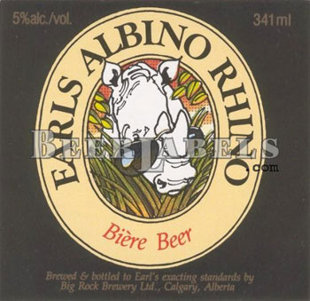As a person with albinism, long time social justice activist and quaffer of the odd pint, I’d like to raise a glass to IK Ero, who made a human rights complaint about the unfortunately named “Albino Rhino” beer — a brand that the Earl’s restaurant chain has now decided to retire.
The word “albino” is supposed to take one to the edgy extreme of taste and refreshment. “Rhino” is just a whimsical, though none-too-clever rhyme. And people have a weird connection between albinism in animals and people. Passers-by stop me constantly to tell me they saw an albino squirrel once, or maybe a rather pale snake. People seem to connect me to animals with albinism.
“Albino Rhino” is supposed to evoke the exotic and strange by referencing a negative stereotype, made popular in TV, movies — like the Da Vinci Code, the Matrix Reloaded and the Princess Bride, literature (Moby Dick) and even the carnival side show.
Albinism is rare — about 1 in 20,000 people — and is characterized by a lack of pigment in the skin, hair and eyes and low vision. It means never looking anything much like your family, friends, classmates, or coworkers. People with albinism are almost always bullied as children and still taunted and stereotyped as adults.
Throughout my life I have received a constant stream of stares, glares, gawks and shout-outs: “Casper” “Billy Idol” “hey albino” or even at the bar on occasion, in tones dripping in sarcasm: “hey man, are you gonna order the Albino Rhino?”
The human rights complainant, IK Ero, who has albinism, says that the Albino Rhino brand is humiliating and discriminatory to people with albinism.
After a lifetime of bad pop culture portrayals and snide comments, I too feel a bit of a sting of humiliation when this brand crosses my path.
But it was the reaction to the complaint that sparked my interest. It met a chorus of disapproval from conservative pundits and the online comments section of local newspapers — the bathroom walls of the Internet. Comments in the hundreds dismissed the complaint as frivolous and hurled insults. Some even made threats. “Lighten up,” some said. “This is political correctness run amok.”
People with albinism are simply trying to have a discussion with the broader society about how we are represented. It’s the same kind of conversation about labels and stereotypes that many other marginalized groups have undertaken. We all have a right to challenge those representations – in cinema and or at the local eatery.
I have been a social justice activist all my life, but I was not part of the Earl’s complaint. However, after hearing this volume of visceral reaction, I agreed to provide evidence to the BC Human Rights Tribunal about what its like living with albinism.
Before ever meeting a person with albinism, most people have experienced hundreds of negative references to albinism in popular culture. I have become an expert at defusing and deflecting — making it into a joke before someone else gets the chance. It has the effect of setting us apart, making us “Others.”
Earl’s is far from the worst offender in this pop culture phenomenon, but their “pale” ale participates in this chorus of jeering. Sure, we could just not go there — and we don’t. But given that only 1 in 20 000 people have albinism; a mass boycott has some obvious logistical challenges.
Now, I’ve had a few pints (for research purposes of course) and it’s a cheeky little ale, just with a dumb name. One more way that mainstream culture points at us and laughs. There aren’t too many places where someone with albinism can just blend in. Earl’s was just another place we didn’t belong, where my very physical being is again made the subject of vague ridicule and brand identity.
The common stereotype of the evil or freaky albino is the cultural landscape onto which Earl’s had poured its pints for the last 25 years. This was a relatively small contribution to the lengthy history of the albino-as-freak meme and I congratulate the restaurant chain on removing its voice from the jeering mob.
So I’ll raise a glass to social change.
The first round is on me. I’ll be at the bar, you can’t miss me.
Garth Mullins is an activist, writer, broadcaster and musician living in Vancouver @garthmullins. Garth’s documentary “The Imaginary Albino” airs on the CBC Radio One program “Ideas” on February 18th at 9:00pm.




